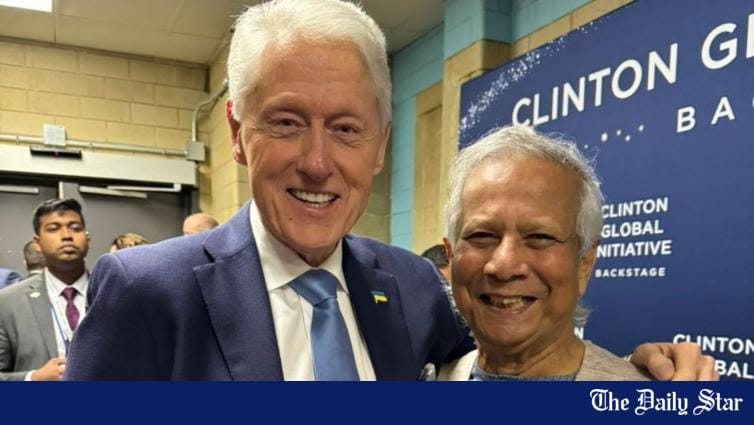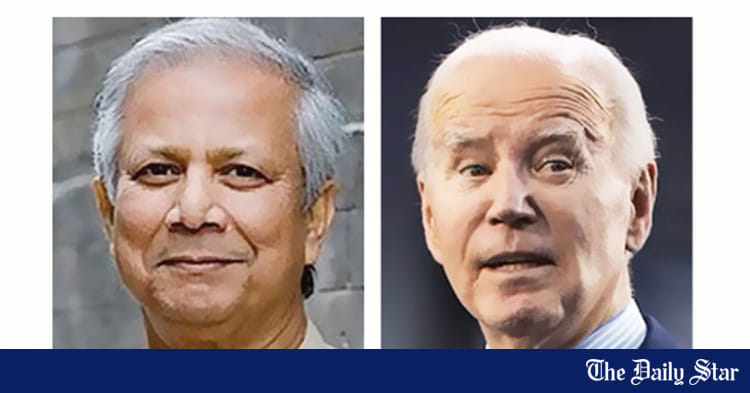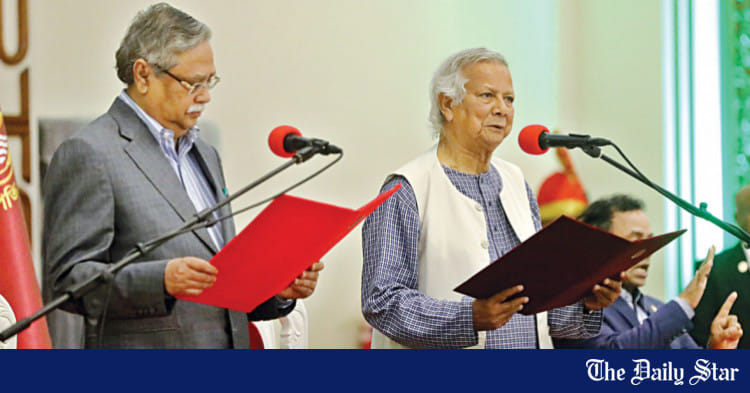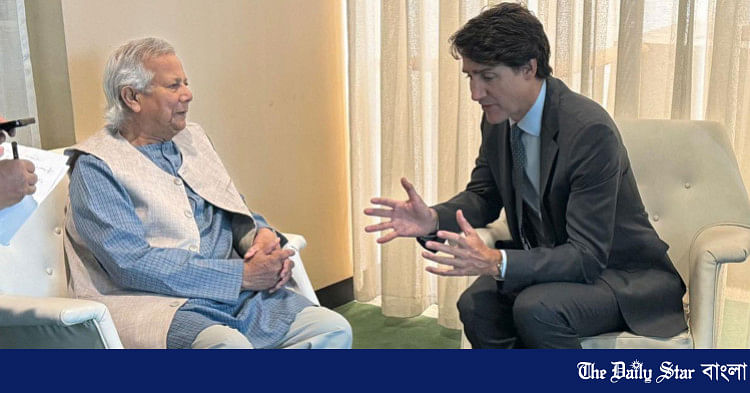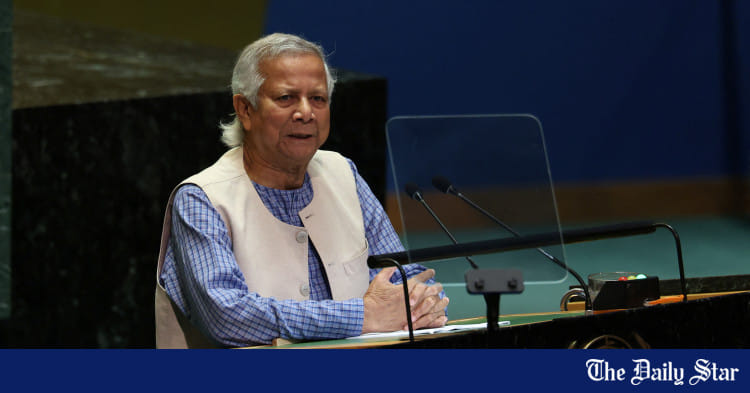Biden offers full US support to Yunus-led govt

US President Joe Biden has offered his country's full support to Bangladesh's interim government during his rare bilateral meeting with Chief Adviser Prof Muhammad Yunus.
They met on the sidelines of the UN General Assembly in New York last night, signalling a new beginning of the relationship that was strained over the last couple of years.
Nobel laureate Yunus apprised Biden how students stood up to the tyranny of the previous government and laid down their lives to create this opportunity to rebuild Bangladesh, according to a statement from the chief adviser's press wing.
He stressed that his government must succeed in rebuilding the country and would need US cooperation.
"President Biden said if the students could make so much sacrifice for their country, they too should do more," the statement said.
Prof Yunus handed a copy of "The Art of Triumph", a book on graffiti drawn by the student protesters and young pupils during the mass uprising, to President Biden.
"This is a rare meeting at the UNGA. It's good news that the US stands beside Bangladesh in this period of transition," Chief Adviser's Press Secretary Shafiqul Alam told UNB.
He said Bangladesh maintains fine relations with the US, and this meeting will take the ties to a new level.
Diplomatic sources told The Daily Star the US president usually goes to the UNGA for a short time and holding any bilateral meetings with the head of Bangladesh government in New York is rare. This meeting signals Washington's deep interest in engaging with Dhaka.
In fact, they said, the US has been trying to deepen the engagement with Bangladesh over the last few years, but it was not going very well.
The US suspended the Generalised System of Preferences (GSP) facility for Bangladesh in the aftermath of the 2013 Rana Plaza collapse, citing poor labour conditions.
In 2021, it imposed sanctions on Rab and seven of its top officials over human rights violations and in May last year announced visa restrictions for those undermining democratic elections.
After the January elections, Washington said the polls were neither free, fair or participatory.
Under the current interim administration, a six-member US delegation, led by Treasury Department's Assistant Secretary Brent Nieman, visited Dhaka mid-September. It expressed the US's commitment to support Prof Yunus' reform agenda, and eagerness to offer technical and financial assistance for reforms.
When the interim government has taken up major reform initiatives in the changed political landscape, Washington is showing increasing interest in Bangladesh.
Analysts said Bangladesh's main challenge now is boosting trade and economy, and Washington has the capacity to support Dhaka to that end.
For example, US can provide GSP facility through a presidential decree, which can help increase Bangladesh's export to the US by $4-$5 billion.
Bangladesh's export to the US now is nearly $8 billion a year.
M Humayun Kabir, a former Bangladesh ambassador to the US, said the US can make investment through the US International Development Finance Corporation, support the reform process, bring back laundered money etc.
Mohammad Sufiur Rahman, a senior research fellow at the South Asian Institute of Policy and Governance at North South University, said the US can also help security reforms that can eventually lead to withdrawal of sanctions against Rab.
Besides, with better political understanding, Bangladesh may reap greater economic benefits and have access to new avenues for much-needed external funds through multilateral lenders like the World Bank, the IMF or the ADB.
YUNUS MEETS TRUDEAU
Yunus also met Canadian Prime Minister Justin Trudeau in New York and discussed ways to cement the Bangladesh-Canada relationship, deepen freedom, build institutions, and support the youth of Bangladesh.
During the brief meeting, he handed "The Art of Triumph" to the Canadian prime minister.
Trudeau appreciated Yunus for assuming the responsibility and expressed Canada's readiness to support institution-building in Bangladesh, according to a statement from the Chief Adviser's Office.
Yunus appreciated Canada for its friendship with Bangladesh and the Canadian government's support for the interim government.
He requested Canada to grant more visas to Bangladeshi students.
Yunus reached New York on Monday night and started his UNGA visit with a reception hosted by the UN Secretary-General Antonio Guterres.
He met prominent world leaders at the reception. He also joined the inaugural session of the UNGA.
This is Prof Yunus' first foreign visit as head of the interim government to attend the 79th UNGA.
The chief adviser will address the General Debate of the UNGA on September 27.
Foreign Affairs Adviser Md Touhid Hossain, Energy Adviser Muhammad Fouzul Kabir Khan, Permanent Representative of Bangladesh to the UN Ambassador Muhammad Abdul Muhith, Principal Coordinator (SDGs Affairs) Lamiya Morshed, and Additional Foreign Secretary Riaz Hamidullah, among others, are accompanying the chief adviser.
Yunus will also attend a high-level side event on the Rohingya crisis and another one titled 'Meet the Friends of Bangladesh'.
He will host a reception on the occasion of the 50th anniversary of Bangladesh's membership of the United Nations.
Chinese Foreign Minister Wang Yi is scheduled to pay the chief adviser a call.
US President Joe Biden has offered his country's full support to Bangladesh's interim government during his rare bilateral meeting with Chief Adviser Prof Muhammad Yunus.
They met on the sidelines of the UN General Assembly in New York last night, signalling a new beginning of the relationship that was strained over the last couple of years.
Nobel laureate Yunus apprised Biden how students stood up to the tyranny of the previous government and laid down their lives to create this opportunity to rebuild Bangladesh, according to a statement from the chief adviser's press wing.
He stressed that his government must succeed in rebuilding the country and would need US cooperation.
"President Biden said if the students could make so much sacrifice for their country, they too should do more," the statement said.
Prof Yunus handed a copy of "The Art of Triumph", a book on graffiti drawn by the student protesters and young pupils during the mass uprising, to President Biden.
"This is a rare meeting at the UNGA. It's good news that the US stands beside Bangladesh in this period of transition," Chief Adviser's Press Secretary Shafiqul Alam told UNB.
He said Bangladesh maintains fine relations with the US, and this meeting will take the ties to a new level.
Diplomatic sources told The Daily Star the US president usually goes to the UNGA for a short time and holding any bilateral meetings with the head of Bangladesh government in New York is rare. This meeting signals Washington's deep interest in engaging with Dhaka.
In fact, they said, the US has been trying to deepen the engagement with Bangladesh over the last few years, but it was not going very well.
The US suspended the Generalised System of Preferences (GSP) facility for Bangladesh in the aftermath of the 2013 Rana Plaza collapse, citing poor labour conditions.
In 2021, it imposed sanctions on Rab and seven of its top officials over human rights violations and in May last year announced visa restrictions for those undermining democratic elections.
After the January elections, Washington said the polls were neither free, fair or participatory.
Under the current interim administration, a six-member US delegation, led by Treasury Department's Assistant Secretary Brent Nieman, visited Dhaka mid-September. It expressed the US's commitment to support Prof Yunus' reform agenda, and eagerness to offer technical and financial assistance for reforms.
When the interim government has taken up major reform initiatives in the changed political landscape, Washington is showing increasing interest in Bangladesh.
Analysts said Bangladesh's main challenge now is boosting trade and economy, and Washington has the capacity to support Dhaka to that end.
For example, US can provide GSP facility through a presidential decree, which can help increase Bangladesh's export to the US by $4-$5 billion.
Bangladesh's export to the US now is nearly $8 billion a year.
M Humayun Kabir, a former Bangladesh ambassador to the US, said the US can make investment through the US International Development Finance Corporation, support the reform process, bring back laundered money etc.
Mohammad Sufiur Rahman, a senior research fellow at the South Asian Institute of Policy and Governance at North South University, said the US can also help security reforms that can eventually lead to withdrawal of sanctions against Rab.
Besides, with better political understanding, Bangladesh may reap greater economic benefits and have access to new avenues for much-needed external funds through multilateral lenders like the World Bank, the IMF or the ADB.
YUNUS MEETS TRUDEAU
Yunus also met Canadian Prime Minister Justin Trudeau in New York and discussed ways to cement the Bangladesh-Canada relationship, deepen freedom, build institutions, and support the youth of Bangladesh.
During the brief meeting, he handed "The Art of Triumph" to the Canadian prime minister.
Trudeau appreciated Yunus for assuming the responsibility and expressed Canada's readiness to support institution-building in Bangladesh, according to a statement from the Chief Adviser's Office.
Yunus appreciated Canada for its friendship with Bangladesh and the Canadian government's support for the interim government.
He requested Canada to grant more visas to Bangladeshi students.
Yunus reached New York on Monday night and started his UNGA visit with a reception hosted by the UN Secretary-General Antonio Guterres.
He met prominent world leaders at the reception. He also joined the inaugural session of the UNGA.
This is Prof Yunus' first foreign visit as head of the interim government to attend the 79th UNGA.
The chief adviser will address the General Debate of the UNGA on September 27.
Foreign Affairs Adviser Md Touhid Hossain, Energy Adviser Muhammad Fouzul Kabir Khan, Permanent Representative of Bangladesh to the UN Ambassador Muhammad Abdul Muhith, Principal Coordinator (SDGs Affairs) Lamiya Morshed, and Additional Foreign Secretary Riaz Hamidullah, among others, are accompanying the chief adviser.
Yunus will also attend a high-level side event on the Rohingya crisis and another one titled 'Meet the Friends of Bangladesh'.
He will host a reception on the occasion of the 50th anniversary of Bangladesh's membership of the United Nations.
Chinese Foreign Minister Wang Yi is scheduled to pay the chief adviser a call.
Last edited:




